Berkeley scholars’ outrage, reflections on U.S. Capitol mob siege
Pundits ponder how to safeguard democracy in the coming weeks, months and years
January 7, 2021
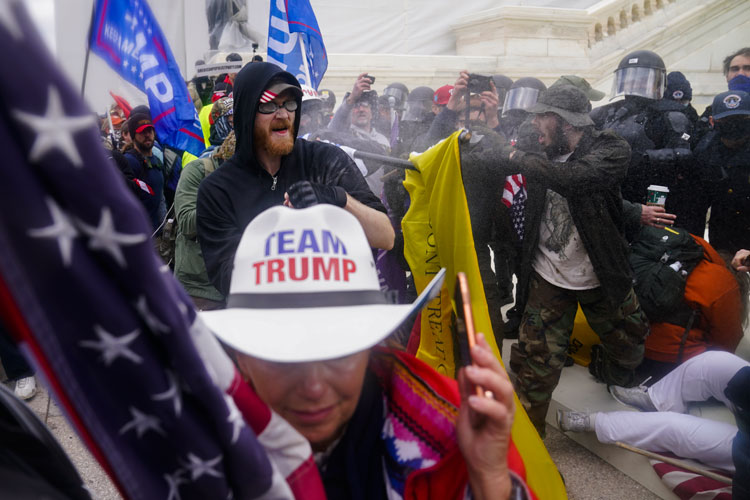
Trump supporters try to break through a police barrier at the U.S. Capitol in Washington (AP Photo/John Minchillo)
Who and what is to blame for the Jan. 6 storming and siege of the U.S. Capitol, an iconic sanctuary of representational democracy? Where will it lead, and how does America avoid a repeat performance in the weeks, months and years to come? Along with the rest of the world, many UC Berkeley scholars have expressed disgust at the insurrection of Trump loyalists against congressional certification of President-elect Joe Biden’s victory, though they are not overly surprised.
Here, they express their views about the attempted coup that shook the world and the issues it raises, including the GOP’s enabling of President Trump’s delusions about overturning the election, a pernicious double standard in policing along racial lines, a lack of preparation by law enforcement and congressional leadership for the disputed certification of electoral college votes, and the coddling of white supremacists and domestic terrorists.
 Henry Brady, dean of Goldman School of Public Policy
Henry Brady, dean of Goldman School of Public Policy
The events in Washington, D.C., on Wednesday, Jan. 6, will go down as the most infamous ending of a presidency in the nation’s history, amounting to a foiled, but very real, attempt to subvert the electoral process that could be called a failed coup. While Donald Trump has shown no sympathy for the legitimate claims of those protesting George Floyd’s death, ever since the Nov. 3 election, he has made unsubstantiated and false claims about the legality and reliability of America’s voting systems. Scores of courts, many of them with judges that he appointed, rejected these claims, and none found significant problems. By urging his followers to come to a rally in Washington, by continuing to make false claims, by urging his supporters to walk to the Capitol and to ‘show strength,’ and by belatedly telling those who entered the Capitol to go home while tweeting, ‘We love you. You’re very special,’ Donald Trump put himself, again, on the side of chaos and disorder in support of his efforts to retain power. The bedlam of the Jan.6 events — including the parading of a Confederate flag through the Capitol — halved the number of senators who were willing to support him. Still, enough senators and members of Congress remained with him to mount unsuccessful bids to decertify the electoral votes of Arizona and Pennsylvania. Joseph Biden will be our president, but with our democracy undermined and legitimate claims ignored because Donald Trump manufactured a crisis. The new president and Congress must work very hard to put American democracy back together.
 Laura Elisa Perez, professor of ethnic studies
Laura Elisa Perez, professor of ethnic studies
There are many things to be learned from the Jan.6 Trump-supported terrorist assault on the Capitol and on the democratic, constitutional process of certifying the election of the president and vice president. One is the immense power of messaging and our equally serious responsibility to exercise critical judgment before it. Lies, insistently repeated by the president, his family and his supporters in Congress, have purposefully led his violent followers to believe them. These lies pertain to the legitimacy of the election, but also to his qualifications. From his denial of sexually assaulting women, to his suggestion that white suburban and religious culture needs to be protected from people of color, and that those who disagree are ‘enemies.’ Yesterday’s scenario is an extreme example of why each of us is called upon to be courageous and independent in our critical thinking before self-serving liars and violent anti-democratic rioting mobs. As the poet Maya Angelou famously said, ‘When somebody shows you who they are, believe them the first time.’
 Jack Glaser, professor of public policy
Jack Glaser, professor of public policy
One of the many outrageous aspects of the Jan. 6 violent insurrection at the U.S. Capitol is the abject failure of the Capitol Police. Having recently reviewed police practices for managing demonstrations, I am confident that it is common practice to stage a large number of officers near a planned protest. Police departments have learned that they can stage some officers and equipment nearby, out of sight, so as to avoid provoking militancy. There are ways to have a strong presence without infringing on people’s right to assemble. Given the frequency of demonstrations near the Capitol, it is inconceivable that USCP was ignorant of these best practices. There should have been a commanding force present, including mutual aid from other agencies. Maybe some officers were too acquiescent with the mob. Others held their ground to the extent that they could. The failure is at the command level, and it is conspicuous.
 Denise Herd, professor of public health and behavioral sciences
Denise Herd, professor of public health and behavioral sciences
The Jan. 6 storming of the U.S. Capitol was shocking and deeply disturbing. However, it was not isolated in terms of threats to lawmakers and democracy spurred on by President Trump that have occurred over the past year. For example, in May, heavily armed right-wing protestors occupied the state Capitol in Michigan, forcing the legislature to close its session to avoid the possibility of armed conflict inside the chamber. The weak reaction of law enforcement to these kinds of violent attacks is also of deep concern. While peaceful protesters for racial justice have been tear-gassed and beaten for merely assembling on city streets, right-wing protesters were allowed to intimidate and endanger the lives of numerous people and desecrate and deface public property. By attacking members of Congress who were elected to represent the people and the Capitol where democratic processes are enacted. The protests signaled not only a fundamental lack of respect for human life, but an attack on democracy itself.
 Don Moore, professor in the Haas School of Business
Don Moore, professor in the Haas School of Business
It takes absolute conviction to motivate violent activism for a cause. It is indeed this sort of zealotry that drives belief in conspiracy theories or debunked falsehoods, such as the idea that there was substantial fraud in November’s election. The Jan. 6 rioters may have been extremists, but most of us believe too readily that we are right and are too reluctant to consider that we might be wrong. This is indeed the foundation on which today’s extreme partisanship is built. All of us are too quick to write off our political opponents as either stupid because they cannot see the facts, or evil, because they deny the truth. The rioters would have been less motivated to commit violence had they been better able to consider the possibility that they were wrong, or that they had been misled by a mendacious president.
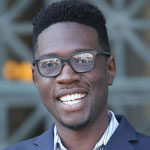 Travis Bristol, assistant professor in the Graduate School of Education
Travis Bristol, assistant professor in the Graduate School of Education
White terror birthed this nation. The Jan.6 terrorist attack at the U.S. Capitol by President Trump’s supporters is a reminder that the American Project will fail if white people do not reckon with and dismantle white supremacy. From the forced enslavement of Africans, to the genocide of Indigenous peoples during westward expansion, to state-sanctioned lynching of Black Americans by white mobs during Jim Crow and of unarmed Black people by white police officers, white Americans have used violence and terror to maintain their power. As a researcher, I continue to name and call attention to the role of white supremacy in maintaining inequity across our nation’s schools. I remain hopeful, however. The more white Americans see and understand how maintaining a white power structure will destroy all of us, the more white Americans will want to work alongside Black, Indigenous and People of Color to birth a new, more perfect union.
 Philip Stark, professor of statistics
Philip Stark, professor of statistics
I’m actually surprised there has not been more violence. Like many others, I predicted the broad plot arc much earlier this year: impugning vote-by-mail, claiming that Election Day results are the ‘real’ outcome, crying fraud when vote shares predictably shifted blue as vote-by-mail ballots were tallied, trying to prevent states from canvassing properly, distorting and weaponizing legitimate concerns about the trustworthiness of U.S. election equipment and procedures, civil litigation, attempts to overturn the election using state legislatures and Congress and mob violence. I expect more violence on or before Inauguration Day. And I’m concerned that Trump will do something dramatic, like start a war, between now and then. I think impeachment is appropriate, as is exercising the 25th Amendment. The former seems more politically feasible than the latter. I also think the attorneys who knowingly filed fraudulent and frivolous suits should be disbarred. For example, the Georgia litigation led by Lin Wood took a declaration I had filed in an unrelated suit, stripped the case caption and the court watermark from it, and filed it as if I were an expert working on his case.
 john powell, professor of African American studies and African Diaspora studies
john powell, professor of African American studies and African Diaspora studies
Many of us stayed up late June 5 following what was happening in Georgia, a stronghold of the old Confederacy and a powerful foundation for segregation and white dominance, which has now elected two Democratic senators, one Black and one Jewish. The significance of this is difficult to overstate. But this joy was interrupted as news came in about American terrorists who want the old Georgia, as reflected in Trump’s anger and racism, to continue to prevail. We have learned to expect no less from Trump. He has demonstrated he does not have any concern or commitment for his friends, supporters or to the country. He is singularly focused on himself. Still, to watch the halls of Congress under attack, while the police took selfies with the terrorists, was disturbing. Our country has two paths, and they both were on display Jan. 6.
 Catherine Ceniza Choy, professor of ethnic studies
Catherine Ceniza Choy, professor of ethnic studies
The Jan. 6 violent attack at the U.S. Capitol against our democracy was the opposite of greatness. As a historian and ethnic studies scholar, I am unsurprised by what happened. Trump’s seditious rhetoric reinvigorated the longstanding practice of racial violence in this country. While the pathbreaking elections of Vice President-elect Kamala Harris and Georgia Senators-elect Jon Ossoff and Raphael Warnack offer hope, white supremacy continues to be a living history that cannot be undone easily and quickly. Today, my heart hurts. I hope all of us take time to check in with ourselves with kindness and compassion.
 Erwin Chemerinsky, dean of the Berkeley School of Law
Erwin Chemerinsky, dean of the Berkeley School of Law
There are many lessons to be drawn, but the most important is that the guardrails of democracy worked. The attack on the Capitol by a violent mob was the sad culmination of two months of Donald Trump trying to overturn the results of the election. Trump incited this, and at no point did he condemn the violence. But ultimately, the rule of law triumphed. A presidential election was held in the midst of a pandemic, with record voter turnout and no identifiable fraud or foreign interference. Election officials, both Republican and Democrat, impartially and accurately counted the votes, even in the face of enormous political pressure to alter the results. Judges — Republican and Democrat — rejected spurious challenges based on the lack of evidence of fraud and the absence of any viable legal claim. Senators and representatives in Congress ultimately accepted the results of the Electoral College, following the process prescribed by the Constitution and federal law.
 Jennifer Chatman, professor in the Haas School of Business
Jennifer Chatman, professor in the Haas School of Business
The attack on our Capitol had many horrendous implications, and four people died as a direct result of the events, so it is difficult to imagine any silver linings embedded in this heinous event. But there is one: The violence and seditious motives of Trump and his ‘base’ were laid bare for all to see. Those who have lulled themselves into believing that Trump’s behavior as president was unsavory, but financially advantageous, and not dangerous or unpresidential, must now face the unequivocal reality that this president is solely and fanatically devoted to advancing his own power and wealth and not to the interests of this country. It is astounding that the corrupt recorded calls to Ukraine and Georgia and likely many more, the insidious mishandling of a pandemic that led to perhaps hundreds of thousands of unnecessary deaths, and the incessant stream of lies and incompetence — all consistent with Trump’s dark triad of narcissism, psychopathy and Machiavellianism — still didn’t convince many Americans of what we are dealing with. Let’s hope this will.
 Steven Weber, political scientist and professor in the School of Information
Steven Weber, political scientist and professor in the School of Information
Jan. 6, 2021, was ugly, but it wasn’t anything like the end of American democracy. What it was is a very tangible signal of just how tenuous our collective hold on civility is right now, in politics and in other aspects of American life, and democracy without civility isn’t worth it. Political civility I think of as the simple practice of treating disagreement (and the people who represent it) with the respect that it deserves. That doesn’t extend to making factually false claims, and it certainly doesn’t extend to violence. But here we are, at the inevitable endgame of a 30-year corrosion of civility, where it’s now commonplace and utterly acceptable to assert that people who disagree with us must be stupid, evil or both. It might feel good in the moment to say that, but most of them aren’t any of those things, and Democrats and Republicans in Congress yesterday saw and felt a physical manifestation of where that kind of outrage leads. What we have to do next is support those who see the opportunity to seize the Republican Party away from the hands of the Trump wing and create something new. Democrats should want this to happen and do what they can to help make it happen. A ‘loyal opposition’ is good, even essential for democratic governance, and anyone who says it’s no longer possible in today’s polarized environment has effectively given up on democracy. Democrats, both moderates and progressives, should be looking to softly ally with emerging parts of the Republican Party that have a vision for something other than populism and anger.
 Frank Worrell, psychologist and professor in the Graduate School of Education
Frank Worrell, psychologist and professor in the Graduate School of Education
Although President Trump is ultimately to blame for the Jan. 6 attack on Congress, the responsibility for this assault on democracy goes way beyond the White House. From the beginning of his campaign and over the course of his four long years in office, he has made several things abundantly clear: He does not believe all Americans are equal under the law. He does not believe that the law applies to him. He does not understand the Constitution of the United States and his responsibility as president to uphold it. Indeed, he does not seem to understand what democracy means. And every time he has used the Office of the President to trample on democracy, he has been reinforced. Each and every political, business and religious leader who has endorsed Trump’s falsehoods and his problematic and unethical behavior over the past four years is culpable for the rioting and vandalism in Congress.
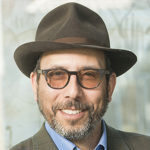 Jonathan Simon, professor of criminal justice law
Jonathan Simon, professor of criminal justice law
The outrage about policing failures in the U.S. Capitol during the insurrectionary events of Jan. 6 are likely to result in an even bigger and more aggressive Capitol Police force. It should not. As a nation, we are in the midst of a long overdue conversation about how to reimagine public safety. The events of Jan. 6 are not a helpful model for the urban security challenges of the present and future. This possible coup attempt was hardly spontaneous. It could and should have been headed off by arrests of the leaders by the FBI and tactical separation of the demonstration areas from the Capitol using large numbers of National Guard troops deployed well in advance. As we undertake the process of exploring 21st century methods for protecting safety and dignity in our cities, we should not let these horrifying images throw us backward.
 Brian Delay, associate professor of history
Brian Delay, associate professor of history
Impunity helped produce all three disgraceful spectacles in Washington, D.C., on Jan.6. Trump openly encouraged supporters to violently overturn the certification of the national election and lauded them afterward. Members of the mob that tore through the Capitol seemed unconcerned with consequences — even shocked and outraged at what little police resistance they encountered. Congressional Republicans who voted to disenfranchise the people of Arizona and Pennsylvania acted in transparent bad faith, without fear of meaningful institutional consequences. That sense of impunity has multiple sources, but its historic taproot is white supremacy. One set of rules for ‘real’ (white) Americans and another for everyone else. The future of our democracy depends, in part, on depriving them of their unearned impunity. Trump must be impeached again, convicted and removed. Every identifiable member of the invading mob must be prosecuted. Congress should censure the cynical election-deniers and, at minimum, strip them of meaningful committee assignments.
 Kurt Organista, professor of social welfare
Kurt Organista, professor of social welfare
I was driving up Interstate 5 in December, an hour north of Los Angeles, after visiting with an ailing relative, when traffic unexpectedly slowed for an annoying hour. Eventually, a caravan of Trump supporters, several miles long, came into view. Dozens of large pickup trucks, cars of various makes and models, all flying huge blue Trump flags and displaying “Stop the Steal” posters. This spectacle was intimidating enough to inhibit taking cellphone video or rolling down the window to voice opposition. I thought about the repetition of such rallies throughout the country, hundreds of thousands of people manipulated to self-righteously defy a free and fair presidential election. Is this what fascism looks like in America, I wondered. However, as I watched the massive pro-Trump mob overwhelm inadequate security, violently storm the capital, and ransack the hallways of democracy, then I knew what fascism looks like in America.
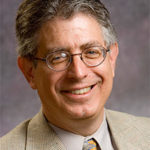 Daniel Farber, professor in the Berkeley School of Law
Daniel Farber, professor in the Berkeley School of Law
The attack on the Capitol should not have been a surprise, given that pro-Trump groups had invaded state capitols in anti-mask protests. Nor should it have been a surprise that Trump encouraged lawless action and dismissed concerns after the fact. That followed his record of support for extremist groups and their illegal acts. The road to this event began in Charlottesville and extended to his encouragement of lawlessness in Michigan, even after an attempted kidnapping of the governor. What has been most disheartening is that Trump’s enablers, including the Republican leadership in the House of Representatives and right-wing media, have continued to follow his lead, minimizing the attack on democracy and adhering to entirely fictitious claims of election fraud. We can only hope this event will act as a wake-up call to others who have supported Trump throughout his presidency.
 Hatem Bazian, lecturer in ethnic studies
Hatem Bazian, lecturer in ethnic studies
As an academic who works on Islamophobia, I documented the emergence of the Birther Movement, the use of conspiracy replacement theories and the pushing of anti-Sharia legislations by fringe elements that finally landed Trump in the White House with the ‘alternative facts’ administration. I have witnessed and documented the alarming rise of right-wing populism, white supremacist extremism and violence directed at Black and Brown communities, Muslims and Jews across the country. Trump stoked a deeply racist and violent side of America that communities of color continue to struggle to overcome. I am not surprised by what happened at the U.S. Capitol and Trump’s role in it. Some GOP leaders and media outlets have been cheering him on for the past four years. The outcome of the Nov. 3 election and Jan. 5 Georgia Senate run-off election reveal the diverse and inclusive society and country we aspire to live in and collectively build. I hope that the unfolding events will awaken in all of us the essence of equality and civil rights under the law and a new energy focused on building the society that all of our children deserve.
 Alexa Koenig, executive director of the Human Rights Center
Alexa Koenig, executive director of the Human Rights Center
The Jan.6 attacks reflect an urgent need to address weaknesses in our information ecosystem — both online and off. Whether we are working as lawyers or journalists or are citizens taking in information, facts matter. On that day, we saw the horrible consequences of the failure of social media platforms to stem misinformation used to foment violence. Ultimately, when it comes to using online platforms to incite criminal activity, social media companies should hold political actors to similar standards as others and preserve information they take down that may have later value as evidence. Many reporters and lawyers need training to ensure that they use social media content ethically and effectively. To that end, we have recently released an international protocol with the United Nations’ Human Rights Office to clarify how online content can be used to secure greater accountability for events like those the world witnessed on Jan.6.
 Dacher Keltner, professor of psychology
Dacher Keltner, professor of psychology
Human history can be thought of as a struggle between two approaches to power. A first can be found its expression in Aristotle’s thinking about virtue in politics: Enduring power is found in courage, integrity, justice and compassion. A second can be found in Machiavelli’s riveting classic, The Prince. Trump’s presidency was textbook Machiavellianism. Lie. Feign religious conviction to curry favor. Stir through mob-based passions. Demand absolute deference, and undermine and – in Machiavelli’s day – kill those who challenge you. For many, Trump’s election astonished, that this practitioner of vice-based power would appeal to so many. But our research, and my 2017 book, The Power Paradox, finds this model of power is indeed endorsed by many — in particular, men who’ve lost power and feel disenfranchised. The Jan.6 insurrection at the Capitol did not surprise; it was likely his last act of ‘keep my power at all costs,’ vice-based power. Let’s hope the pendulum of history swings back to the practice of virtue in American politics.
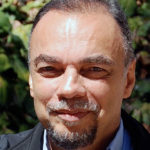 Charles Henry, professor emeritus of African American studies and African Diaspora studies
Charles Henry, professor emeritus of African American studies and African Diaspora studies
All of this could have been prevented if the vice president and majority leader of the Senate had decided to follow the Constitution and permitted the trial of a rogue president. Instead, Pence and McConnell are now targets of the protesters. They placed him above the law, and he has wasted no time in proving it. Those corrupt operatives that were thrown into jail have been pardoned. Those Republicans who have shown any resistance have been banished from Washington either voluntarily or involuntarily. They have been replaced in the halls of Congress by conspiracy theorists. Back in what seems like a different era, 2008, I was part of a team of observers sent by the Carter Center to encourage free and fair elections in the presidential race in Ghana. Both of the major candidates had borrowed the theme of ‘hope and change’ from Obama’s campaign. I would be ashamed now to set foot in the country.
 Coye Cheshire, professor in the School of Information
Coye Cheshire, professor in the School of Information
My fear from these events is a further crumbling of institutional trust in the U.S. at a point when trust is already at historic lows (based on decades of national surveys). Given these dangerously low levels of trust, the single most shocking thing to me was how easy it was for Trump supporters to violently storm the U.S. Capitol during a joint session of Congress. In contrast, many of us watched an entirely different response a few months ago in D.C., when armed National Guard members in riot gear blocked monuments and fired rubber bullets against racially diverse, non-violent Black Lives Matter protesters. The closest thing to a silver lining: The imminent change in executive and congressional power provides a chance to demonstrate trustworthiness through consistency and transparency in our institutional responses to non-violent and violent collective action. For the sake of our democracy, I hope we take advantage of this renewed opportunity.
 Robin Lakoff, professor emerita of linguistics
Robin Lakoff, professor emerita of linguistics
Well, now we know it’s true: Donald J. Trump could stand in the middle of Fifth Avenue and shoot somebody and get away with it. We know that’s true because, on Jan.6, he did. There’s no point looking for more derogatory words to describe yesterday’s events – insurrection, riot, attempted coup and so on. The important thing now is to keep it from happening again, whether instigated by Trump or, at some future time, by another wannabe tin-pot dictator. I certainly don’t assume that Trump won’t try something very similar in the next 13 days: perhaps making it safer for himself by first invoking martial law or declaring war on Iran. You can accomplish a lot in 13 days if you are president. And Trump’s friends are already finding excuses and euphemisms for his actions. The actions on Jan. 6 did not constitute Trump’s first moves toward a coup: In retrospect, we can see that virtually everything he has said or tweeted since taking office was meant as a rehearsal — shooting blanks on Fifth Avenue to ascertain what would happen if he used real bullets. Therefore, Americans must face forward, rather than backward. There needs to be meaningful punishment for Trump himself and the rioters he stirred up, but also those Republican members of Congress who aided and abetted them and granted them legitimacy, for now and for the future, by trying to keep the Electoral College votes from being certified. Worst of all were those who didn’t even change their tune after it was clear what it had helped to accomplish. Ideally, Trump should be re-impeached and, this time, removed from office, or the 25th Amendment should be used to remove him. In either case, the removal should be worded so as to prevent him from ever holding public office again. But both of these are most probably not doable. But at the very least, Americans should recall or electorally defeat those members of Congress who acted as enablers.
 Michael Mark Cohen, associate professor of African American studies and African Diaspora studies
Michael Mark Cohen, associate professor of African American studies and African Diaspora studies
No one who witnessed the events in Berkeley from the spring of 2017 should be surprised by the white supremacist riot at the U.S. Capitol. In many ways, yesterday’s riot has its origins in Berkeley. Starting that February, in support of the right-wing agitator Milo Yiannopoulos, the city of Berkeley was repeatedly invaded by members of the Proud Boys, III% Militia, Identity Europa and other fascist organizations. These people, many of whom were undoubtedly present on Jan.6 in D.C., came to Berkeley to attack citizens and disrupt classes, all in the name of free speech. However, these attacks upon our community were repeatedly confronted and repelled by the citizens of the Bay Area organized under the banner of anti-fascism. And because of this resistance, the far-right’s incursions ceased, and their hateful gaze turned elsewhere. We kept us safe. Throughout this period, many argued that we should not face this enemy, that we should ignore the Proud Boys, that Milo’s free speech was more important than our safety, and that confrontation would only feed their fire. Today, all of us should reflect upon just how wrong, tragically wrong, that assessment was and remains. On Jan.6, in the face of an unopposed white mob, aided by the Republican Party and abetted by racist policing, we saw the consequences of trying to ignore the rising tide of fascism in America.